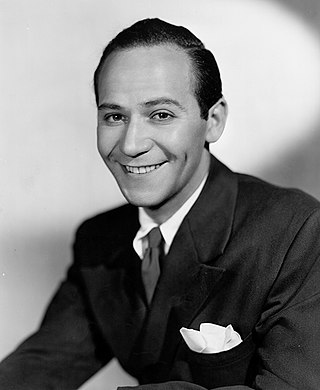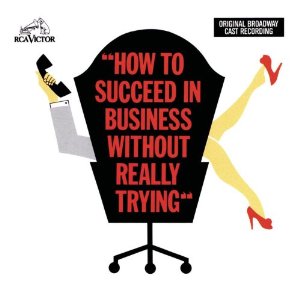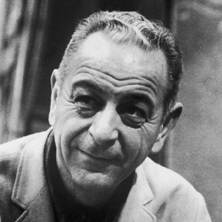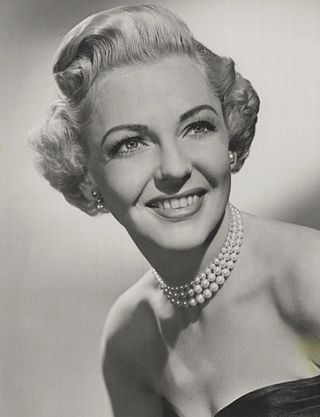Related Research Articles

Frank Henry Loesser was an American songwriter who wrote the music and lyrics for the Broadway musicals Guys and Dolls and How to Succeed in Business Without Really Trying, among others. He won a Tony Award for Guys and Dolls and shared the Pulitzer Prize for Drama for How to Succeed. He also wrote songs for over 60 Hollywood films and Tin Pan Alley, many of which have become standards, and was nominated for five Academy Awards for best song, winning once for "Baby, It's Cold Outside".

Chicago is a 1975 American musical with music by John Kander, lyrics by Fred Ebb, and book by Ebb and Bob Fosse. Set in Chicago in the jazz age, the musical is based on a 1926 play of the same title by reporter Maurine Dallas Watkins, about actual criminals and crimes on which she reported. The story is a satire on corruption in the administration of criminal justice and the concept of the "celebrity criminal".

Guys and Dolls is a musical with music and lyrics by Frank Loesser and book by Jo Swerling and Abe Burrows. It is based on "The Idyll of Miss Sarah Brown" (1933) and "Blood Pressure", which are two short stories by Damon Runyon, and also borrows characters and plot elements from other Runyon stories, such as "Pick the Winner". The show premiered on Broadway in 1950, where it ran for 1,200 performances and won the Tony Award for Best Musical. The musical has had several Broadway and London revivals, as well as a 1955 film adaptation starring Frank Sinatra, Marlon Brando, Jean Simmons, and Vivian Blaine.

How to Succeed in Business Without Really Trying is a 1961 musical by Frank Loesser and book by Abe Burrows, Jack Weinstock, and Willie Gilbert, based on Shepherd Mead's 1952 book of the same name. The story concerns young, ambitious J. Pierrepont Finch, who, with the help of the book How to Succeed in Business Without Really Trying, rises from window washer to chairman of the board of the World Wide Wicket Company.
A cast recording is a recording of a stage musical that is intended to document the songs as they were performed in the show and experienced by the audience. An original cast recording or OCR, as the name implies, features the voices of the show's original cast. A cast recording featuring the first cast to perform a musical in a particular venue is known, for example, as an "original Broadway cast recording" (OBCR) or an "original London cast recording" (OLCR).

Burton Lane was an American composer and lyricist primarily known for his theatre and film scores. His most popular and successful works include Finian's Rainbow in 1947 and On a Clear Day You Can See Forever in 1965.

Dolores Conchita Figueroa del Rivero, known professionally as Chita Rivera, was an American actress, singer, and dancer. Rivera received numerous accolades including two Tony Awards, two Drama Desk Awards, and a Drama League Award. She was the first Latina and the first Latino American to receive a Kennedy Center Honor in 2002, and the Presidential Medal of Freedom in 2009. She won the Tony Award for Lifetime Achievement in 2018.

Sam Levene was a Russian-American Broadway, films, radio, and television actor and director. In a career spanning over five decades, he appeared in over 50 comedy and drama theatrical stage productions. He also acted in over 50 films across the United States and abroad.
Forbidden Broadway, Volume 3 is the third album released to accompany Gerard Alessandrini's off-Broadway show Forbidden Broadway, which spoofs Broadway's latest musicals. Volume 3 was recorded at Sound On Sound, New York City, November 11 & 15, 1993; mixed at DSW Mastering Studios, NYC, and released in 1994.
Forbidden Hollywood is a parody show that opened Off-Off-Broadway and was taped live in Hollywood. It was created by Gerard Alessandrini, who also created the popular series of Off-Broadway parodies of Broadway theatre, Forbidden Broadway. But this production, instead of spoofing Broadway, lampooned popular films such as Forrest Gump, Sense and Sensibility, Pulp Fiction, Casablanca, The Wizard of Oz and Disney's Aladdin, and songs featured in them, although most of the score consists of songs from musicals used to comment on the films. It also spoofs movie stars like Tom Hanks, Keanu Reeves, Barbra Streisand, Ann-Margret and Whoopi Goldberg. A New York Times reviewer wrote that although the production had funny moments, "the tone that defines the show is a glib disaffection for Hollywood", lamenting that the show missed the opportunity to use more songs from films, and concluding: "It's fine if Mr. Alessandrini wants to see Hollywood as the enemy, but you have to know your enemy to take good aim at it."
"A Bushel and a Peck" is a popular song written by Frank Loesser and published in 1950. The song was introduced in the Broadway musical Guys and Dolls, which opened at the 46th Street Theater on November 24, 1950. It was performed on stage by Vivian Blaine and a women's chorus as a nightclub act at the Hot Box. It is the first of two nightclub performances in the musical. Although Blaine later reprised her role as Miss Adelaide in the 1955 film version of the play, "A Bushel and a Peck" was omitted from the film and replaced by a new song, "Pet Me, Poppa."
Elizabeth Josephine Sullivan Loesser was an American actress and high lyric soprano singer. She became a musical theatre star with her performance in the original production of The Most Happy Fella, for which she was nominated for a Tony Award in 1957.

Vivian Blaine was an American actress and singer, best known for originating the role of Miss Adelaide in the musical theater production of Guys and Dolls, as well as appearing in the subsequent film version, in which she co-starred with Marlon Brando, Jean Simmons and Frank Sinatra.
"Fugue for Tinhorns" is a song written and composed by Frank Loesser and first performed by Stubby Kaye, Johnny Silver, and Douglas Deane in 1950. The song was featured in the Broadway musical Guys and Dolls.
"If I Were a Bell" is a song composed by Frank Loesser for his 1950 musical Guys and Dolls.

Guys and Dolls is a 1955 American musical film starring Marlon Brando, Jean Simmons, Frank Sinatra, and Vivian Blaine. The picture was made by Samuel Goldwyn Productions and distributed by Metro-Goldwyn-Mayer (MGM). It was directed by Joseph L. Mankiewicz, who also wrote the screenplay. The film is based on the 1950 Broadway musical by composer and lyricist Frank Loesser, with a book by Jo Swerling and Abe Burrows, which, in turn, was loosely based on "The Idyll of Miss Sarah Brown" (1933) and "Blood Pressure", two short stories by Damon Runyon. Dances were choreographed by Michael Kidd, who had staged the dances for the Broadway production.
"I've Never Been in Love Before" is a song written by Frank Loesser, published in 1950.

Reprise Musical Repertory Theatre is a series of four 12" long playing vinyl albums recorded in Los Angeles in 1963. The four albums were sold through mail order as a box set in 1963, then released separately to retail in 1964. They were conceived and produced by Frank Sinatra. Morris Stoloff was the musical director and the A&R Director was Sonny Burke.
Heart & Soul: The Life and Music of Frank Loesser is a 2006 American documentary film about Guys and Dolls composer/lyricist Frank Loesser. Directed by Walter J. Gottlieb, it is credited as the first-ever TV documentary about Loesser and was produced by Gottlieb and associate producer James F. Cooney in co-operation with Frank Loesser Enterprises and his widow, Broadway actress and singer Jo Sullivan Loesser. The documentary debuted on Public Broadcasting Service (PBS) Public television stations nationwide in 2006 and ran throughout 2007. The film details the triumphant musical career of Loesser, who rose from humble New York City beginnings as the son of German Jewish immigrant parents to become the acclaimed composer/lyricist of 5 Broadway musicals and several Hollywood movie songs which became American pop standards, such as "Heart and Soul", "On a Slow Boat to China", and "Baby, It's Cold Outside".
"More I Cannot Wish You" is a song written and composed by Frank Loesser and first performed by Pat Rooney, Sr. in 1950. The song was featured in the musical Guys and Dolls. The sentimental lyrics relate the feelings of the oldest character in the play, missionary Arvide Abernathy, who sings it tenderly to his granddaughter, Sarah Brown.
References
- ↑ Dietz, Dan (July 2, 2014). The Complete Book of 1950s Broadway Musicals. Rowman & Littlefield. p. 39. ISBN 978-1442235052 . Retrieved July 27, 2021.
- ↑ "Vivian Blaine," Encyclopædia Britannica Online.
- ↑ Scott Simon (host). "Creation of the musical Guys and Dolls, Weekend Edition Saturday, National Public Radio, November 25, 2000
- ↑ Riis, Frank L. (2008). Frank Loesser . New Haven and London: Yale University Press. pp. 94. ISBN 978-0-300-11051-7.
- ↑ Elysa Gardner. "Pop Goes Broadway" (review), USA Today, March 4, 2002, p. 3D.
- ↑ The 25th Annual Tony Awards (1971) at Internet Movie Database